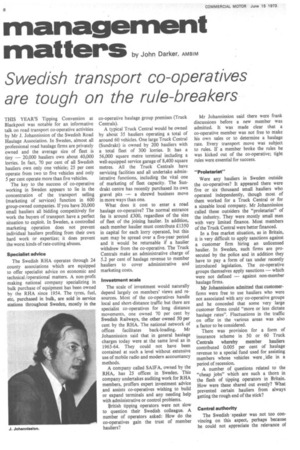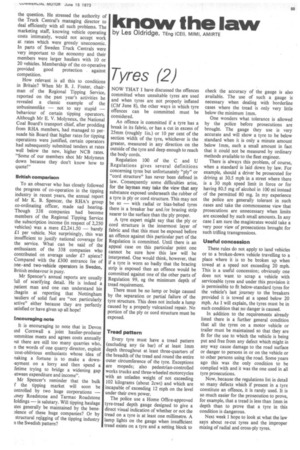management
Page 90

Page 91

If you've noticed an error in this article please click here to report it so we can fix it.
matters by John Darker, AMBIM
Swedish transport co-operatives are tough on the rule-breakers
THIS YEAR'S Tipping Convention at Blackpool was notable for an informative talk on road transport co-operative activities by Mr J. Johannission of the Swedish Road Haulage Association. In Sweden, almost all professional road haulage firms are privately owned and the average size of fleet is tiny — 20,000 hauliers own about 40,000 lorries. In fact, 70 per cent of all Swedish hauliers own only one vehicle; 25 per cent operate from two to five vehicles and only 5 per cent operate more than five vehicles.
The key to the success of co-operative working in Sweden appears to lie in the concentration of the transport selling (marketing of services) function in 600 group-owned companies. If you have 20,000 small hauliers all bidding competitively for work the buyers of transport have a perfect situation to exploit. In Sweden, a controlled marketing operation does not prevent individual hauliers profiting from their own hard work or expertize; it does prevent the worst kinds of rate-cutting abuses.
Specialist advice The Swedish RHA operates through 24 county associations which are equipped to offer specialist advice on economic and technical /operational matters. A non-profit making national company specializing in bulk purchase of equipment has been owned by the RHA since 1954. The tyres, fuel, etc, purchased in bulk, are sold in service stations throughout Sweden, mostly in the co-operative haulage group premises (Truck Centrals).
A typical Truck Central would be owned by about 35 hauliers operating a total of around 60 vehicles. One large Truck Central (Sundrakt) is owned by 200 hauliers with a total fleet of 300 lorries. It has a 56,000 square metre terminal including a well-equipped service garage of 8,400 square metres. All the Truck Centrals have servicing facilities and all undertake administrative functions, including the vital one of marketing of fleet capacity. The Sundrakt centre has recently purchased its own gravel pits — a shrewd business move in more ways than one.
What does it cost to enter a road haulage co-operative? The normal entrance fee is around £300, regardless of the size of fleet of the joining haulier. In addition, each member haulier must contribute £1350 in capital for each lorry operated, but this sum may be spread over a five-year period and it would be returnable if a haulier withdrew from the co-operative. The Truck Centrals make an administrative charge of 5.2 per cent of haulage revenue to member hauliers to cover administrative and marketing costs.
Investment scale The scale of investment would naturally depend largely on members' views and resources. Most of the co-operatives handle local and short-distance traffic but there are specialist co-operatives for long distance movements, one owned 70 per cent by Swedish Railways, the other owned 50 per cent by the RHA. The national network of offices facilitates back-loading. Mr Johannission said that in general haulage charges today were at the same level as in 1963-64. They could not have been contained at such a level without extensive use of mobile radio and modern accountancy methods, A company called SAIFA, owned by the RHA, has 25 offices in Sweden. This company undertakes auditing work for RHA members, proffers expert investment advice and assists co-operatives wishing to build or expand terminals and any needing help with administrative or control problems.
British tipping operators were not slow to question their Swedish colleague. A number of operators asked: How do the co-operatives gain the trust of member hauliers? Mr Johannission said there were frank discussions before a new member was admitted. It was made clear that a co-operative member was not free to make his own sales or to determine a haulage rate. Every transport move was subject to rules. If a member broke the rules he was kicked out of the co-operative; tight rules were essential for success.
"Proletariat" Were any hauliers in Sweden outside the co-operatives? It appeared there were five or six thousand small hauliers who operated independently, though most of them worked for a Truck Central or for a sizeable local company. Mr Johannission called these outsiders the "proletariat" of the industry. They were mostly small men with very limited finance. Most members of the Truck Central were better financed.
In a free market situation, as in Britain, it is very difficult to apply sanctions against a customer firm hiring an unlicensed haulier. In Sweden, such firms are prosecuted by the police and in addition they have to pay a form of tax under recently introduced legislation. The co-operative groups themselves apply sanctions — which were not defined — against non-member haulage firms.
Mr Johannission admitted that customerfirms were free to use hauliers who were not associated with any co-operative groups and he conceded that some very large customer firms could "more or less dictate haulage rates". Fluctuations in the traffic on offer in the various areas was also a factor to be considered.
There was provision for a form of insurance scheme in 50 or 60 Truck Centrals whereby member hauliers contributed 0.005 per cent of haulage revenue to a special fund used for assisting members whose vehicles were idle in a period of recession.
A number of questions related to the "cheap jobs" which are such a thorn in the flesh of tipping operators in Britain. How were these shared out evenly? What prevented certain hauliers from always getting the rough end of the stick?
Central authority The Swedish speaker was not too convincing on this aspect, perhaps because he could not appreciate the relevance of the question. He stressed the authority of the Truck Central's managing director to deal efficiently with all such problems. The marketing staff, knowing vehicle operating costs intimately, would not accept work at rates which were grossly uneconomic. In parts of Sweden Truck Centrals were very important to the economy and their members were larger hauliers with 10 or 20 vehicles. Membership of the co-operative provided good protection against competition.
How relevant is all this to conditions in Britain? When Mr B. J. Foster, chairman of the Regional Tipping Service, reported on the past year's activities he revealed a classic example of the unbusinesslike — not to say stupid — behaviour of certain tipping operators. Although Mr E. V. Molyneux, the National Coal Board's transport chief, after prodding from RHA members, had managed to persuade his Board that higher rates for tipping operations were justified, certain operators had subsequently submitted tenders at rates well below the new, higher NCB rates. "Some of our members shot Mr Molyneux down because they don't know how to quote!"
British comparison
To an observer who has closely followed the progress of co-operation in the tipping industry in recent years, the annual report of Mr K. B. Spencer, the RHA's group co-ordinating officer, made sad hearing. Though 338 companies had become members of the Regional Tipping Service the subscription income (in respect of 2,250 vehicles) was a mere £2,241.50 — barely £1 per vehicle. Not surprisingly, this was insufficient to justify national coverage for the service. What can be said of the enthusiasm of the 338 companies who contributed on average under £7 apiece? Compared with the £300 entrance fee of
one two-vehicle operators in Sweden, British endeavour is puny.
Mr Spencer's annual reports are usually Full of scarifying detail. He is indeed a patient man and one can understand his ;hagrin at reporting that Nottingham tauliers of solid fuel are "not particularly ictive" either because they are perfectly ;atisfied or have given up all hope!
Encouraging note
It is encouraging to note that in Devon tnd Cornwall a joint haulier-producer :ommittee meets and agrees costs annually )ut there are still too many quarries who, n the words of one quarry director, exploit cost-oblivious enthusiasts whose idea of riaking a fortune is to make a downJayment on a lorry and then spend a fetime trying to bridge a widening gap etween expenditure and income".
Mr Spencer's reminder that the bulk f the tipping market will soon be ontrolled by two huge corporations — ,rney Roadstone and Tarmac Roadstone to!dings — is salutary. Will tipping haulage ites generally be maintained by the beneolence of these huge companies? Or by structural rejigging of the tipping industry a the Swedish pattern?












































































































































